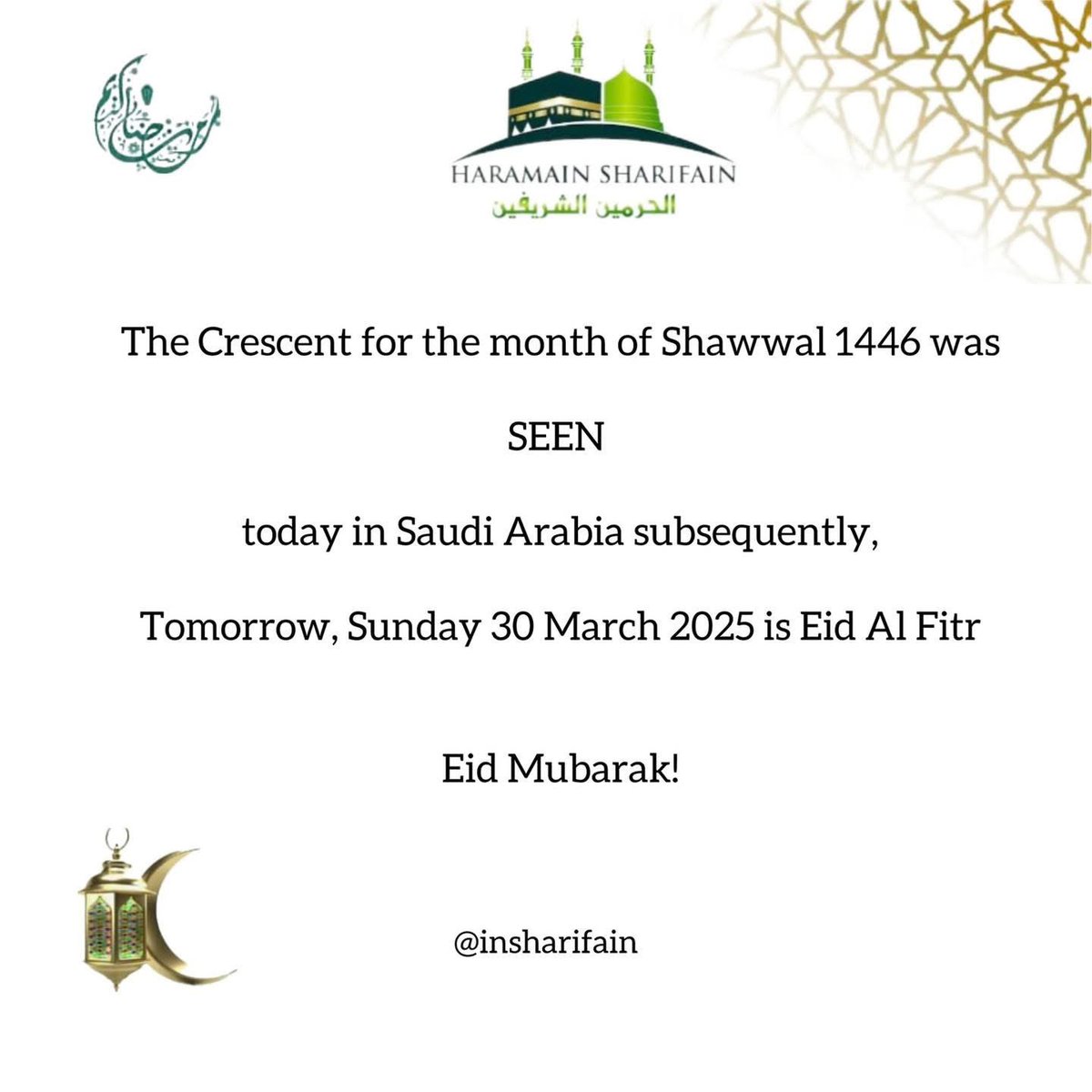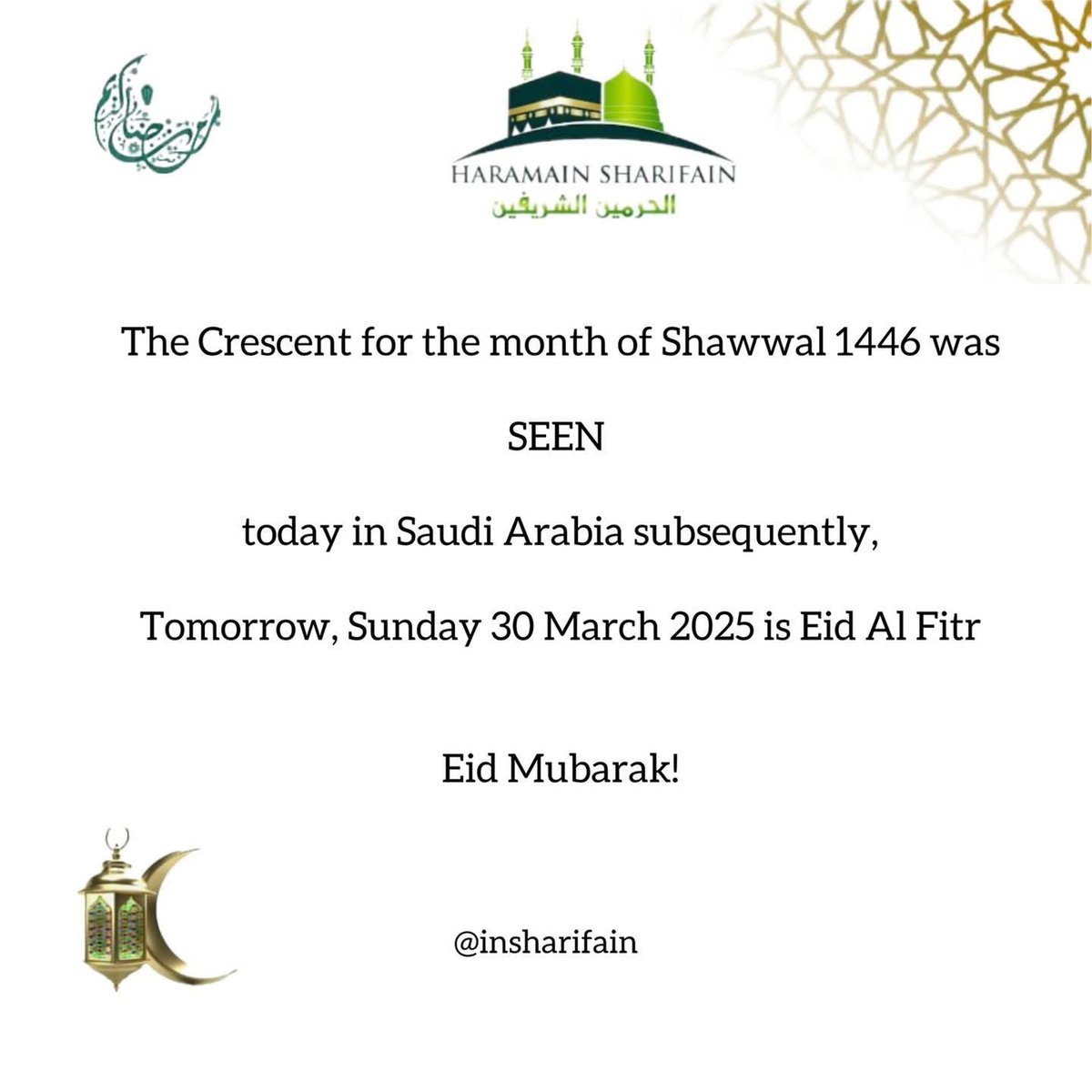Breaking: Saudi Arabia Sees Crescent; Controversy Erupts Over Eid
Eid Al Fitr 1446: Celebrating the End of Ramadan
Eid Al Fitr, known as the Festival of Breaking the Fast, is one of the most significant religious celebrations for Muslims around the world. In 2025, Eid Al Fitr will be observed on Sunday, March 30, marking the end of Ramadan, a month of fasting, prayer, and reflection. As confirmed by recent reports, the crescent moon for the month of Shawwal 1446 was sighted in Saudi Arabia, signaling the commencement of this auspicious occasion.
The Importance of Eid Al Fitr
Eid Al Fitr holds immense cultural and spiritual significance. It is a time for Muslims to come together with family and friends, expressing gratitude for the strength and patience shown during Ramadan. This festive day is characterized by communal prayers, feasting, and acts of charity. It symbolizes not only the end of fasting but also a renewal of faith and community bonds.
Moon Sighting: The Tradition Behind the Date
The observance of Eid Al Fitr is determined by the sighting of the crescent moon, a tradition that dates back to the time of the Prophet Muhammad. The Islamic calendar is lunar-based, making moon sighting an essential practice to determine the beginning of each month. In 2025, the crescent moon was successfully sighted in Saudi Arabia, confirming that Eid will be celebrated on March 30. Notably, many countries, including Nigeria, await their local moon sighting reports to finalize their Eid celebrations.
Celebrating Eid Al Fitr
On the day of Eid, Muslims gather for the special Eid prayer, which typically takes place in large open areas or mosques. This prayer is a community event that fosters unity and collective worship. Following the prayer, it is customary to greet one another with “Eid Mubarak,” meaning "Blessed Eid."
- YOU MAY ALSO LIKE TO WATCH THIS TRENDING STORY ON YOUTUBE. Waverly Hills Hospital's Horror Story: The Most Haunted Room 502
The celebration continues with festive meals, where families prepare traditional dishes. In many cultures, it is common to serve sweet dishes such as baklava, dates, and various desserts to symbolize the joy of the occasion. Sharing food with neighbors and those in need is also a crucial aspect of Eid, reflecting the values of charity and community support.
Acts of Charity and Giving
One of the core tenets of Eid Al Fitr is the act of giving, particularly through Zakat al-Fitr, a form of charity given to the less fortunate before the Eid prayer. This obligation ensures that all Muslims, regardless of their financial situation, can partake in the festivities. Zakat al-Fitr serves to purify the fast and is a compassionate reminder of the needs of those who are less fortunate, fostering a spirit of generosity and community.
Cultural Variations in Celebrating Eid
While the essence of Eid Al Fitr remains the same, the ways in which it is celebrated can vary significantly across different cultures. In Indonesia, for example, the festivities may include traditional dances and elaborate decorations, while in Turkey, it might involve visiting the graves of loved ones and sharing meals with extended families. Each culture adds its unique touch to the celebration, enriching the global tapestry of Eid traditions.
The Global Impact of Eid Al Fitr
Eid Al Fitr is not only a significant event in Muslim-majority countries but is also acknowledged globally. In many non-Muslim countries, local communities may participate in Eid festivities, reflecting a growing recognition and appreciation of cultural diversity. Schools and workplaces often acknowledge the holiday, allowing Muslim employees and students to celebrate with their families.
Preparing for Eid Al Fitr
In the lead-up to Eid, many Muslims prepare by purchasing new clothes, decorating their homes, and preparing special meals. The atmosphere is filled with excitement as families plan gatherings and activities. Shopping for Eid gifts and treats is a common practice, enhancing the sense of joy and anticipation leading up to the celebration.
Community and Family Bonding
Eid Al Fitr is fundamentally about family and community. It provides an opportunity for reconciliation and strengthening bonds. Many families take this time to visit relatives, exchange gifts, and enjoy each other’s company. The communal aspect of Eid reinforces the importance of social ties, reminding individuals of their shared faith and values.
Conclusion
As we approach Eid Al Fitr on March 30, 2025, it is an excellent time to reflect on the significance of this festival, the values it promotes, and the unity it brings among Muslims worldwide. With the crescent moon sighted, the excitement for the upcoming celebrations is palpable. Whether through prayers, feasting, or acts of charity, Eid Al Fitr serves as a powerful reminder of the importance of community, gratitude, and compassion in our lives.
Final Thoughts
In conclusion, Eid Al Fitr is more than just a festival; it is a celebration of faith, unity, and joy. As families and communities come together to observe this special day, it is vital to embrace the spirit of charity and compassion that defines this occasion. May the celebration of Eid Al Fitr bring peace, happiness, and blessings to all.
For further updates and local announcements related to Eid Al Fitr, especially regarding moon sightings in various regions, it is advisable to stay tuned to local authorities and community leaders. Happy Eid Mubarak in advance!

BREAKING NEWS: Eid Al Fitr 1446/2025 is tomorrow: Sunday, 30 March 2025
The Crescent for the month of Shawwal 1446 was SEEN in Saudi Arabia today subsequently tomorrow is the beginning of the month of Shawwal 1446
We await the Nigerian authorities. pic.twitter.com/JxztJuDj2a
— MS Ingawa (@MSIngawa) March 29, 2025
BREAKING NEWS: Eid Al Fitr 1446/2025 is tomorrow: Sunday, 30 March 2025
Eid Al Fitr is one of the most celebrated festivals in the Islamic calendar, marking the end of Ramadan, the holy month of fasting. This year, the excitement is palpable as communities around the world prepare to celebrate Eid Al Fitr 1446/2025, set for tomorrow, Sunday, March 30, 2025. The anticipation has been building, and with the recent announcement that the crescent moon for the month of Shawwal 1446 was sighted in Saudi Arabia, Muslims worldwide are gearing up for a day filled with joy, prayer, and community.
This sighting not only signifies the end of Ramadan but also the beginning of Shawwal, a month that holds special significance for many. It’s a time of gratitude, reflection, and celebration with family and friends. The excitement surrounding Eid is not just limited to Saudi Arabia; it resonates deeply with Muslim communities everywhere, including Nigeria, where many are eagerly waiting for local authorities to announce the sighting of the moon.
The Crescent for the month of Shawwal 1446 was SEEN in Saudi Arabia today
The sighting of the crescent moon is a significant event for Muslims, as it officially marks the start of Eid Al Fitr. This year, the announcement came from Saudi Arabia, where the moon was confirmed to have been seen. This quick confirmation allows Muslims all over the world to align their celebrations with those in the birthplace of Islam.
In many cultures, the sighting of the crescent moon is accompanied by age-old traditions and practices. Families gather to share in the joy of the occasion, often preparing special meals and sweets. The celebration is not just about the food; it’s about community, togetherness, and the joy of giving. In Nigeria, for instance, local customs may feature unique dishes and festivities that reflect the rich cultural heritage of the region.
Eid Al Fitr is also a time for charity and giving back. Many Muslims take the opportunity to give Zakat al-Fitr, a form of charity meant to purify those who fast from any indecent act or speech and to help the poor. The importance of giving during this festive time cannot be overstated, as it embodies the spirit of community and compassion that is central to the teachings of Islam.
Subsequently, tomorrow is the beginning of the month of Shawwal 1446
With the confirmation of the crescent moon sighting, it’s official: tomorrow marks the beginning of Shawwal 1446. This month is significant in many ways. It is not only the month following Ramadan but also a time when Muslims are encouraged to continue their acts of worship and kindness. The Prophet Muhammad (peace be upon him) recommended fasting six days in the month of Shawwal, which is believed to bring the reward of fasting for an entire year.
As you prepare for Eid, consider what you can do to make the day special. Whether it’s planning a family gathering, cooking traditional dishes, or reaching out to those in need, the spirit of Eid is about connection and gratitude. It’s a wonderful opportunity to reflect on the lessons learned during Ramadan and to carry those lessons into the new month.
For many, Eid Al Fitr also means wearing new clothes, exchanging gifts, and attending special prayers at mosques. The atmosphere is filled with joy and celebration, as families come together to honor the end of Ramadan and the start of a new month. The sense of community during this time is truly heartwarming, as individuals from all walks of life come together to celebrate their faith.
We await the Nigerian authorities
While the crescent moon has been sighted in Saudi Arabia, many in Nigeria are looking forward to their own announcements regarding the sighting. The local authorities play a crucial role in confirming the beginning of Shawwal, and this news is often met with enthusiasm and excitement. In a country where the Muslim population is significant, the announcement of Eid can bring a sense of unity and joy that is palpable in the streets.
Communities across Nigeria prepare for the celebrations in various ways. From colorful decorations to special prayers, the essence of Eid is felt in every corner. Families often visit each other, share meals, and exchange greetings of “Eid Mubarak,” a phrase that translates to “Blessed Eid.” These traditions create a bond among community members, reinforcing a sense of belonging and togetherness.
Social media platforms have also played a significant role in how the news of Eid is shared and celebrated. With updates being shared in real time, families can stay connected and share their preparations and excitement. As you scroll through your feeds, you’ll likely come across beautiful photos of festive meals, prayers, and gatherings, all showcasing the vibrant spirit of Eid.
In the days leading up to Eid, many people also take the time to reflect on the lessons learned during Ramadan. The month of fasting is a time for personal growth, discipline, and spiritual connection. Carrying those lessons into Shawwal can enhance one’s spiritual journey and help foster a deeper connection to the community.
As the day approaches, remember to embrace the joy and spirit of Eid Al Fitr. Whether you’re celebrating with family, friends, or your local community, the essence of this festival lies in togetherness, gratitude, and love. So, get ready to don your best attire, enjoy delicious food, and share in the blessings of this beautiful occasion.
Eid Al Fitr is not just a day; it’s a celebration of faith, community, and the bonds that unite us all. Embrace the joy, share the blessings, and let the spirit of Eid fill your heart with happiness.

